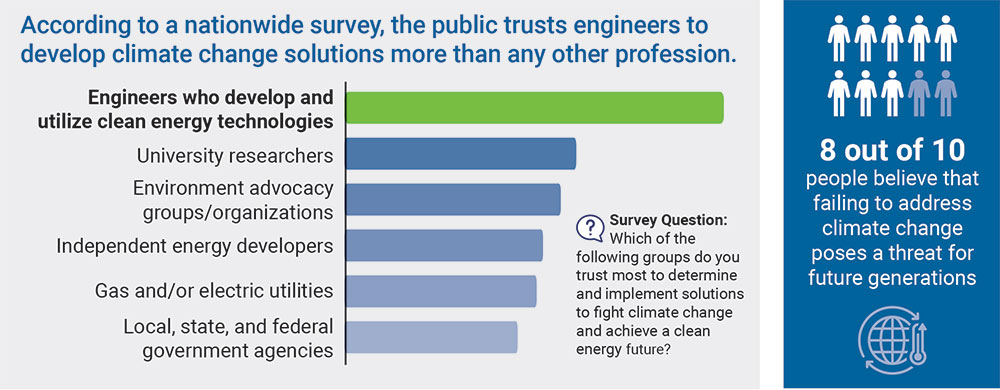Climate Change
Home / Climate Change
Latest from the PES

To Fight Climate Change, We Must Invest More in the Right Places.
By Shay Bahramirad, IEEE PES President

Survey on the Roll of Engineers in Addressing Climate Change
Last fall, IEEE PES commissioned a nationwide survey to gauge the public’s perception of climate change, and specifically the role of engineers in driving solutions to combat climate change.
Other IEEE Climate Change Resources
IEEE’s mission is to advance technology for the benefit of humanity. Today the world faces its largest modern-day threat—climate change. We recognize this global crisis and are committed to helping combat and mitigate the effects of climate change through pragmatic and accessible technical solutions and providing engineers and technologists with a neutral space for discussion and action.
IEEE PES Perspectives
Our members have made climate change initiatives a priority. Read what they have to say about power and energy, and how we can make a difference through the smart applications of technology.
- All
- Aerospace electronics
- Aging
- Air pollution
- Aircraft propulsion
- Airplanes
- Array signal processing
- Authentication
- Automotive engineering
- Batteries
- Bayes methods
- Biological system modeling
- Biomass
- Boats
- Carbon
- Carbon dioxide
- Carbon emissions
- Carbon tax
- Caron emissions
- Circuit breakers
- Circuit faults
- Climate change
- Coal
- Cogeneration
- Computational modeling
- Computer architecture
- Conference Panel
- Control systems
- Controllability
- Convex functions
- Cooling
- Correlation
- Costs
- Cryogenics
- Current transformers
- Data models
- Data processing
- Decarbonization
- Decision making
- Decision theory
- Deep learning
- Degradation
- Dielectric breakdown
- Digital simulation
- Discharges (electric)
- Distributed databases
- Economics
- Electric breakdown
- Electric potential
- Electric vehicles
- electricity
- Electricity supply industry
- Electrodes
- Emissions trading
- Energy consumption
- Energy efficiency
- Energy management
- Energy measurement
- Energy resolution
- energy saving
- Energy storage
- Energy Transportation
- Environmental factors
- Europe
- Feature extraction
- Feedback loop
- Finance
- Fires
- Floods
- Forecasting
- Fossil fuels
- foundational support systems
- Frequency control
- Frequency conversion
- Frequency measurement
- Fuel cells
- Fuels
- Gases
- General Meeting
- Generators
- Geology
- Global warming
- Government policies
- green
- Green products
- Greenhouse effect
- Grid Technologies
- Harmonic analysis
- Heat pumps
- Heating
- Heating systems
- Hurricanes
- HVDC transmission
- Hybrid power systems
- Hydrogen
- Hydrogen powered vehicles
- Hydrogen storage
- Ice
- IEEE smart grid
- Insulation
- Intelligent sensors
- Internal combustion engines
- interview
- Inverters
- Investment
- Investments
- ISGT
- Islanding
- Levee
- lifestyles
- Lighting
- Load flow analysis
- Load management
- Load modeling
- Low-carbon economy
- Maintenance engineering
- Markov processes
- Mathematical model
- Measurement
- Meteorological factors
- Meteorology
- Microgrids
- new information technologies
- Open source software
- Optimization
- Panel Discussion
- Partial discharges
- PES Day
- Photovoltaic systems
- Planning
- Power distribution planning
- Power electronics
- Power generation
- Power grid
- Power grids
- Power markets
- Power outages
- Power system dynamics
- Power system economics
- Power system planning
- Power system reliability
- Power system stability
- Power systems
- Power transmission
- Power transmission lines
- Predictive models
- Pricing
- Probabilistic logic
- Probability density function
- Production
- Programming
- Protons
- Reactive power
- Real-time systems
- Regulation
- Reinforcement learning
- reliability
- Renewable energy sources
- Renewal Energy
- Resilience
- Resistance heating
- Resource management
- Risk management
- Robustness
- Routing
- Runtime
- Safety
- Satellites
- Sea measurements
- Security
- Sensor systems and applications
- Smart Buildings
- Smart cities
- Smart grids
- Solar energy
- Solar panels
- Solar power generation
- Space heating
- Stakeholders
- Statistics
- Stochastic processes
- Storms
- Sulfur hexafluoride
- Superconductivity
- Support vector machines
- Sustainable development
- Switchgear
- System integration
- TandD
- Target recognition
- TD Grid Modernization
- Technical Report
- Technological innovation
- Thermostats
- Transactive energy
- Transforms
- Transient analysis
- Transportation
- Trigeneration
- Tropical cyclones
- Uncertainty
- Urban areas
- Value of DERs
- Value of Grid Resources
- Video
- Voltage control
- Voltage fluctuations
- Voltage measurement
- Waste management
- Water heating
- Water resources
- Webinar
- Wind
- Wind energy
- Wind energy generation
- Wind farms
- Wind forecasting
- Wind power generation
- Wind turbines
- Wireless communication
Hydrogen-Electric Aircraft Technologies and Integration: Enabling an Environmentally Sustainable Aviation Future
As the global community grapples with growing concerns of a changing climate, many eyes have turned to the sustainability of the transportation sector. In the United States, transportation is currently the leading category contributing to all greenhouse gas emissions, producing more emissions per year than the electricity generation, industry, commercial and residential, and agricultural sectors individually. As various transportation modes transition to more sustainable models, such as with the use of battery-electric vehicles, the aviation sector has struggled to identify effective solutions for future sustainability goals, largely due to the difference in power and energy requirements of aircraft, as compared to other vehicles.
Read More >
Read More >
Wildfire Resiliency: California Case for Change
The world has seen an increase in catastrophic wildfires that have caused loss of lives, massive economic impacts from the properties and structures destroyed, and negative impacts on our environment and ecosystem. A recent study by the U.S. Geological Survey shows the greenhouse gas emissions from the 2018 California wildfires is on par with the entire year of equivalent emissions from all electricity generations combined feeding the needs of California.
Read More >
Read More >
CF3I Gas Mixtures: Breakdown Characteristics and Potential for Electrical Insulation
SF6 is a potent greenhouse gas, and there has been research into more environmental friendly alternative gases with the aim of replacing the use of SF6 gas in high-voltage equipment. So far, the research into alternative gases has shown that CF3 I gas mixtures have promising dielectric properties comparable to those of SF6 . This paper provides an overview of research into CF3 I gas and its mixtures, and gives an insight into its key properties. These include laboratory tests on the gas mixtures and initial applications to electrical power equipment.
Read More >
Read More >
Nonlinear Performance Degradation Prediction of Proton Exchange Membrane Fuel Cells Using Relevance Vector Machine
Environmental issues, especially global warming due to the greenhouse effect, have become more and more critical in recent decades. As one potential candidate among different alternative “green energy” solutions for sustainable development, the proton exchange membrane fuel cell (PEMFC) has received extensive research attention for many years for energy and transportation applications. In this paper, an advanced self-adaptive relevance vector machine (RVM) has been developed and demonstrated to predict the performance degradation of PEMFCs.
Read More >
Read More >
Toward Fully Renewable Electric Energy Systems
Renewable energy sources are here to stay for a number of important reasons, including global warming and the depletion of fossil fuels. We explore in this paper how a thermal-dominated electric energy system can be transformed into a renewable-dominated one. This study relies on a stochastic programming model that allows representing the uncertain parameters plaguing such long-term planning exercise. Being the final year of our analysis 2050, we represent the transition from today to 2050 by allowing investment in both production and transmission facilities, with the target of achieving a renewable-dominated minimum-cost system. The methodology developed is illustrated using a realistic large-scale case study. Finally, policy conclusions are drawn.
Read More >
Read More >
Decomposition Strategy for Districts as Renewable Energy Hubs
In light of the energy transition, it becomes a widespread solution to decentralize and to decarbonize energy systems. However, limited transformer capacities are a hurdle for large-scale integration of solar energy in the electricity grid. The aim of this paper is to define a novel concept of renewable energy hubs and to optimize its design strategy at the district scale in an appropriate computational time. To overcome runtime issues, the Dantzig–Wolfe decomposition method is applied to a mixed-integer linear programming framework of the renewable energy hub.Distributed energy units as well as centralized district units are considered.
Read More >
Read More >
Two-Scale Stochastic Control for Integrated Multipoint Communication Systems With Renewables
Increasing threats of global warming and climate changes call for an energy-efficient and sustainable design of future wireless communication systems. To this end, a novel two-scale stochastic control framework is put forth for smart-grid powered coordinated multi-point (CoMP) systems. Taking into account renewable energy sources, dynamic pricing, two-way energy trading facilities, and imperfect energy storage devices, the energy management task is formulated as an infinite-horizon optimization problem minimizing the time-averaged energy transaction cost, subject to the users’ quality of service requirements.
Read More >
Read More >
The Green Impact: How Renewable Sources Are Changing EU Electricity Prices
The European Union (EU) energy policy focuses on achieving a balance between three main pillars: increase the security of supply, reduce the impact of climate change, and improve economic competitiveness. To accomplish these objectives, the EU has been creating competitive conditions that internalize environmental externalities, and it has also actively promoted renewable energy.
Read More >
Read More >
Enabling Cryogenic Hydrogen-Based CO2-Free Air Transport: Meeting the Demands of Zero Carbon Aviation
Flightpath 2050 from the European Union (EU) sets ambitious targets for reducing the emissions from civil aviation that contribute to climate change. Relative to aircraft in service in year 2000, new aircraft in 2050 are to reduce CO 2 emissions by 75% and nitrogen oxide (NOx) emissions by 90% per passenger kilometer flown. While significant improvements in asset management and aircraft and propulsion-system efficiency and are foreseen, it is recognized that the Flightpath 2050 targets will not be met with conventional jet fuel.
Read More >
Read More >
Data-Driven Engineering: The Reliability and Resilience of the North American Bulk Power System [Technology Leaders]
Electricity is an essential need for modern society. Nearly everything we do relies on safe and affordable electric energy. The constant demand for reliable energy delivery exists during a time of rapid changes to and evolutions of the bulk power system (BPS) in North America. Inverter-based resources, such as wind, solar photovoltaic (PV), battery energy storage systems, and hybrid plants, continue to transform the mix of BPS-connected generating resources. Sustainability and climate change initiatives are driving innovations in end-use loads, such as the electrification of the transportation sector.
Read More >
Read More >
Conditional Kernel Density Estimation Considering Autocorrelation for Renewable Energy Probabilistic Modeling
Renewable energy is essential for energy security and global warming mitigation. However, renewable power generation is uncertain due to volatile weather conditions and complex equipment operations. It is therefore important to understand and characterize the uncertainty in renewable power generation to improve operational efficiency. In this paper, we proposed a novel conditional density estimation method to model the distribution of power generation under various weather conditions. Compared with existing literature, our approach is especially useful for the purpose of short-term modeling, where the temporal dependence plays a more significant role.
Read More >
Read More >
An Innovative Coalitional Trading Model for a Biomass Power Plant Paired With Green Energy Resources
The role of biomass resources to diminish the dependency on fossil fuels is steadily increasing worldwide. More importantly, governments set goals to boost the share of renewable energy resources in the power sector to face up to global warming issues. In this paper, a coalitional game model for the trading of a Biomass Power Plant (BPP) paired with a concentrating solar power facility and a wind park is proposed.
Read More >
Read More >
Resilience Assessment of Distribution Systems Integrated With Distributed Energy Resources
The resilience of electric systems is receiving growing attention due to their increased vulnerability to infrastructure damages and widespread outages from frequent extreme climactic conditions attributed to global warming effects. Resilience evaluation methods should recognize the uncertainties and correlations in the performance variations of different types of energy resources, load characteristics, extreme events and their impacts on the grid elements.
Read More >
Read More >
Robust Energy and Reserve Dispatch Under Variable Renewable Generation
Global warming and environmental pollution concerns have promoted dramatic integrations of renewable energy sources all over the world. Associated with benefits of environmental conservation, essentially uncertain and variable characteristics of such energy resources significantly challenge the operation of power systems. In order to implement reliable and economical operations, a robust energy and reserve dispatch (RERD) model is proposed in this paper, in which the operating decisions are divided into pre-dispatch and re-dispatch.
Read More >
Read More >
The Island Hydrogen Project: Electrolytic Generated Hydrogen for Automotive and Maritime Applications
In 2014, the transport sector was responsible for 23% of total greenhouse gas emissions in the European Union (EU). During the same year, 13% of that sector's emissions came from the maritime segment, a number that is expected to rise during the coming years. The transport sector's share of renewable energy in 2014 was just 5.9%, mostly comprising biodiesel and bioethanol fuel.Electrification is a solution that will help reduce the transport sector's reliance on hydrocarbonbased fuels. This article describes the Island Hydrogen project, which introduced and tested new solutions to produce and use hydrogen as a fuel for vehicles and vessels.
Read More >
Read More >
Towards Optimal Coordination Between Regional Groups: HVDC Supplementary Power Control
With Europe dedicated to limiting climate change and greenhouse gas emissions, large shares of Renewable Energy Sources (RES) are being integrated in the national grids, phasing out conventional generation. The new challenges arising from the energy transition will require a better coordination between neighboring system operators to maintain system security. To this end, this paper studies the benefit of exchanging primary frequency reserves between asynchronous areas using the Supplementary Power Control (SPC) functionality of High-Voltage Direct-Current (HVDC) lines.
Read More >
Read More >
Harnessing the Full Potential of Clean Energy: The Role of Southern California’s Utility Distributed Energy Resource Pilots
California is committed to achieving carbon neutrality to reduce the threat of climate change by 2045. This will require deep decarbonization across all economic sectors and necessitate rigorous planning to keep energy safe, reliable, and affordable. Southern California Edison (SCE), a utility that delivers electricity to 15 million people across southern, central, and coastal California, undertook an in-depth analysis to identify a feasible and economical path to realizing California's greenhouse gas reduction goals and achieve carbon neutrality at the lowest reasonable cost by 2045.
Read More >
Read More >
Communication Is Key: How to Discuss Energy and Environmental Issues with Consumers
Scientists are now more certain than ever that humans are responsible for climate change through the combustion of fossil fuels. A recent Global Energy Assessment report, compiled by the International Institute for Applied Systems Analysis, indicates that, globally, domestic energy consumption accounts for about a quarter of global greenhouse gas emissions. A fundamental shift in energy consumption is needed, moving away from the use of fossil fuels to meet emission reduction targets.
Read More >
Read More >
Social Challenges of Electricity Transmission: Grid Deployment in Germany, the United Kingdom, and Belgium
The European Union needs to decarbonize its energy generation to reach its goals of climate change mitigation and energy security policies. In 2011, the European Commission published a road map to reduce greenhouse gases (GHG) by at least 80% by 2050. The road map foresees five pathways, and, across all of them, renewable energy generation plays a significantly stronger role today. The deployment of renewable energy sources (RES ) to generate electricity is one possible option to decarbonize energy generation.
Read More >
Read More >
Decarbonization of Electricity Systems in Europe: Market Design Challenges
Driven by climate change concerns, Europe has taken significant initiatives toward the decarbonization of its energy system. The European Commission (EC) has set targets for 2030 to achieve at least 40% reduction in greenhouse gas emissions with respect to the 1990 baseline level and cover at least 32% of the total energy consumption in the European Union (EU) through renewable energy sources, predominantly wind and solar generation.
Read More >
Read More >
On the Trade-Off Between Environmental and Economic Objectives in Community Energy Storage Operational Optimization
The need to limit climate change has led to policies that aim for the reduction of greenhouse gas emissions. Often, a trade-off exists between reducing emissions and associated costs. In this article, a multi-objective optimization framework is proposed to determine this trade-off when operating a Community Energy Storage (CES) system in a neighborhood with high shares of photovoltaic (PV) electricity generation capacity.
Read More >
Read More >
Integrating Variable Renewables in Europe: Current Status and Recent Extreme Events
In recent months, energy policy in the European Union (EU) has started to focus on the concrete actions required to ensure the realization of a functioning internal energy market in the context of high levels of renewable energy in the post-2020 period. The most important developments include the agreement by the European Council on energy and climate targets for 2030 and the launch of the Energy Union by the European Commission in February 2015. European energy strategy will be strongly based on the development of variable renewables such as wind and PVs.
Read More >
Read More >
Optimal Carbon Taxes for Emissions Targets in the Electricity Sector
The most dangerous effects of anthropogenic climate change can be mitigated by using emissions taxes or other regulatory interventions to reduce greenhouse gas (GHG) emissions. This paper takes a regulatory viewpoint and describes the Weighted Sum Bisection method to determine the lowest emission tax rate that can reduce the anticipated emissions of the power sector below a prescribed, regulatorily-defined target. This bilevel method accounts for a variety of operating conditions via stochastic programming and remains computationally tractable for realistically large planning test systems, even when binary commitment decisions and multiperiod constraints on conventional generators are considered.
Read More >
Read More >
Performance Degradation of Levee-Protected Electric Power Network Due to Flooding in a Changing Climate
This paper presents a methodological framework to evaluate the resilience, with the primary focus on performance degradation, of levee-protected electric power networks to flooding in a changing climate. To this end, a multi-disciplinary framework is established by integrating climate science, hydrology, and electric power network analysis. The framework quantifies the effect of climate change on flood hazard levels in a levee-protected area and the subsequent changes in the resilience of the electric power network.
Read More >
Read More >
Other IEEE Climate Change Resources
© Copyright 2023 IEEE — All rights reserved. A not-for-profit organization, IEEE is the world’s largest technical professional organization dedicated to advancing technology for the benefit of humanity.







